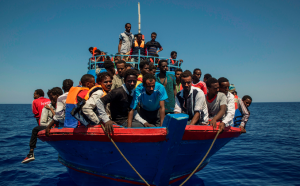‘Refugee rentierism’ on the rise
It’s called ‘refugee rentierism’ and it is a term increasingly being used to describe the way rich nations are outsourcing their perceived immigration problems.
It basically boils down to financial arrangements struck between wealthy countries and poorer ones to stop the onward movement of irregular migrants.
Observers say that deals have negative impacts on the global humanitarian protection system, are not sustainable and undermine principles of transparency, accountability and democracy.
Researcher Gerasimos Tsourapas, of the University of Glasgow, says refuge rentierism sees states receiving refugee rent because other governments do not want the migrants and refugees they are harbouring.
The EU signing an increasing number of agreements to send billions of dollars to neighbouring countries to contain migrants; and the US pursuing similar policies throughout Latin America, are some recent examples, Professor Tsourapas said.
 The UK also has tried to implement a similar policy since 2022 when it struck and agreement with Rwanda to send asylum seekers who crossed the English Channel by boat to the African nation.
The UK also has tried to implement a similar policy since 2022 when it struck and agreement with Rwanda to send asylum seekers who crossed the English Channel by boat to the African nation.
After several court challenges, the UK parliament passed a bill making the policy law in April this year.
However, the new UK Labour government, which removed the Conservative Party from power after 14 years in July, has vowed to scrap the plan.
Rwanda had already received more than $US300 million from the UK under the deal, even though no asylum seekers had arrived.
In a similar scenario, the US struck an agreement with Colombia and Panama last year to increase border controls and limit migration through the Darien Gap – a main channel for asylum seekers and migrants trying to reach the US’ southern border.
As part of the deal, the US agreed to support poverty reduction measures and improve economic cooperation with the two nations.
Refugee rentierism has also occurred between countries in Europe.
Greece, which is one of the first European points of arrival for migrants, received almost 3.4 billion euros from the EU to manage migrants between 2014 and 2020. It will receive another 1.45 billion euros in deal till 2027.
Currently, about 75 per cent of the world’s 43 million refugees are hosted in low- and middle-income countries.
Human rights groups and UN agencies have slammed refugee rentier policies, such as the UK’s Rwanda plan, for undermining the global refugee protection system and ignoring human rights concerns.
The deals also shift the responsibility for hosting displaced people onto the shoulders of countries with fewer resources, they say.
Aid agencies and refugee advocates have reported a plethora or examples of abuse carried out by security forces against asylum seekers and migrants in some of these countries.
Migrants are also being used as political bargaining chips.
Recently, Turkey announced it would no longer prevent refugees from leaving the country toward Greece and even put some people on buses and sent them to the frontier.
The effect of this was to create a manufactured migrant crisis as a way of leveraging EU support for its actions against Kurdish groups in northern Syria.
The EU eventually promised an extra three billion euros.
“In signing migration and refugee deals, the EU encourages more states to use vulnerable humans as bargaining chips. This means states can engineer refugee crises from thin air,” Prof Tsourapas said.












